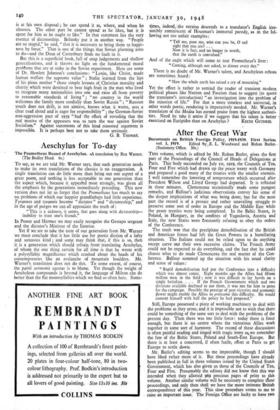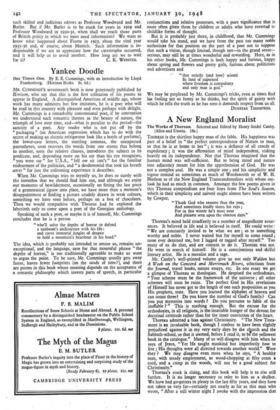After the Great War
Documents on British Foreign Policy, 1919-1939. First Series.
vol. 1, 1919. Edited byfrE. L. _Woodward and Rohan Butler.- (Stationery Office. 30s.)
Tins volume, which is edited by Mr. Rohan Butler, gives the first part of the Proceedings of the Council of Heads of Delegations at Paris. This body succeeded on July Is; 1919, the Councils of Ten, Four and Five which had drawn up the peace treaty with Germany and prepared a good many of the treaties with the smaller enemies. I well remember the lowering of temperature which occurred after President Wilson and Lloyd George had departed. It is reflected in these minutes. Clemenceau occasionally made some pungent remarks, and Balfour's judicious observations convey his sense of the deeper implications of what was being done; but for the most part the record is of a prosaic and rather unavailing struggle to preserve some sort of order in Europe and the Middle East while the peace treaties were being completed. In the Baltic States, in Poland, in Hungary, in the confines of Yugoslavia, Austria and Italy, the new States were Constantly refusing to obey the orders of the Conference.
The truth was that the precipitate demobilisation of the British and American forces had left the Great Powers in a humiliating situation. The Italians could not be relied upon to do anything except carve dut their own excessive claims. The French Army could not be expected to do everything, and the fact that he could choose what to do made Clemenceau the real master of the Con- ference. Balfour summed up the situation with his usual clarity and sense of values:
" Rapid demobilisation had put the Conference into a difficulty which was almost comic. Eight months ago the Allies had fifteen million men in the field ; now it was difficult to lay hands on a single battalion. . . . If the French Government which nad two divisions available declined to use them, it was not for him to press for the campaign. Possibly the prestige of past victories and economid power might enable the Allies to overcome this difficulty. He would content himself with half the policy he had 'proposed."
Still, Europe possessed a piece of working machinery to deal with the problems as they arose, and it is impossible not to wish that there could be something of the same sort to deal with the problems of the present day. Then there was too little 'force: today there is force enough, but there is no centre where the victorious Allies work together in some sort of harmony. The record of these discussions is often painful reading and tinged with tragic irony awe remember the fate of the Baltic States, Poland and South-East Europe. But there is at least a concerted, if often futile, effort at Paris to get Europe to settle down.
Mr. Butler's editing seems to me impeccable, though I should have liked rather more of it. But these proceedings have already been published in full in three volumes issued by the United States Government, which has also given us those of the Councils of Ten, Four and Five. Presumably the editors did not know that this was intended whefl they allotted 969 precious pages of print to this volume. Another similar volume will be necessary to complete tfiese proceedings, and only then shall we have the more intimate British correspondence of this year. This slow procedure seems to me to raise an important issue. The Foreign Office are lucky to have two such skilled and judicious editors as Professor Woodward and Mr. Butler. But if Mr. Butler is to be stuck for years in 1919 and Professor Woodward in 193o-3i, when shall we reach those parts of British policy in which we most need information? We want to know what happened about Fiume in 1923, about the vital year 1935-36 and, of course, about Munich. Such information is in- dispensable if we are to appreciate how the catastrophe occurred, and it will help us to avoid another. How long are we to wait



































 Previous page
Previous page